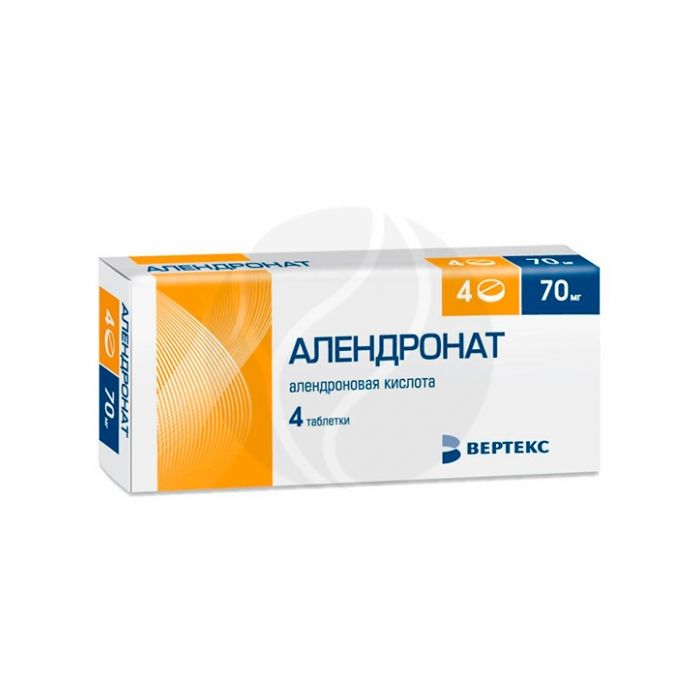Alendronate tablets 70mg, No. 4
Expiration Date: 11/2025
Russian Pharmacy name:
Алендронат таблетки 70мг, №4
Treatment and prevention of osteoporosis in postmenopausal women.
Treatment of osteoporosis in men with the aim of increasing bone mass.
Treatment of osteoporosis caused by the use of corticosteroids in men and women.
Paget's disease (bone damage) in men and women.
Individual, depending on the indications.
alendronic acid
Esophageal stricture
achalasia,
inability of the patient to stand or sit upright for at least 30 minutes after taking the drug,
hypocalcemia,
hypersensitivity to alendronic acid.
pharmachologic effect
Bone resorption inhibitor. Aminobisphosphonate is an analogue of pyrophosphate. The mechanism of action is associated with the suppression of osteoclast activity. Stimulates osteogenesis, restores a positive balance between bone resorption and restoration, progressively increases bone mineral density (regulates calcium-phosphorus metabolism), promotes the formation of bone tissue with a normal histological structure.
Pharmacokinetics
Taking alendronic acid immediately before, during or after a meal leads to a decrease in bioavailability. When taken with coffee or orange juice, the bioavailability of alendronate sodium is reduced by approximately 60%. After oral administration in therapeutic doses, the concentration of alendronate in blood plasma is usually below the lowest concentration that can be determined (less than 5 ng / ml). It is temporarily distributed in soft tissues, then quickly redistributed into the bones or excreted in the urine. Plasma protein binding is approximately 78%. Not metabolized. It is excreted mainly by the kidneys. T1 / 2 in the final phase can be more than 10 years, which is associated with the release of the active substance from the bones.
Side effect
From the digestive system: pain in the epigastric region; rarely - constipation, diarrhea, flatulence, dysphagia.
From the side of metabolism: asymptomatic hypocalcemia. Dermatological reactions: skin rash, erythema.
Others: headache, myalgia.
Application during pregnancy and lactation
Adequate and strictly controlled clinical studies of the safety of the use of alendronic acid during pregnancy and lactation have not been conducted. If necessary, use during lactation, breastfeeding should be discontinued. In experimental studies on rats, it was shown that alendronic acid at doses of 2 mg / kg / day and higher causes discoordination of labor due to hypocalcemia; at doses more than 5 mg / kg / day, a decrease in fetal weight was noted.
Application for impaired renal function
Not recommended for severe renal impairment.
Application in children
Not recommended for use in children.
special instructions
It is not recommended for use in severely impaired renal function, as well as in children. Use with caution in diseases of the gastrointestinal tract in the acute phase. Before starting treatment, patients with mineral metabolism disorders should be fully corrected. The interval between taking alendronic acid and other drugs should be at least 1 hour.
Drug interactions
When taken orally with other drugs and products containing calcium, the absorption of alendronic acid is impaired. In postmenopausal women who received estrogens, there were no side effects associated with the use of alendronic acid. In clinical studies, an increase in the frequency of adverse reactions from the digestive system was observed when using alendronic acid at a dose of more than 10 mg / day during therapy with acetylsalicylic acid.

